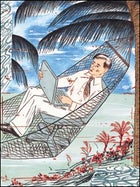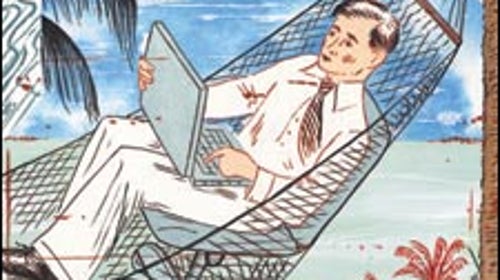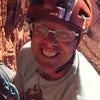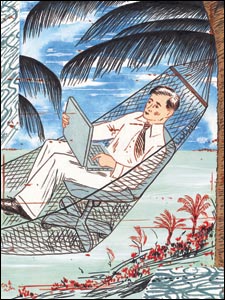I'M ON A PLANE bound for El Salvador when it hits me: I'm having a vacation emergency.
El Salvador
 Illustration by Brian Cronin
Illustration by Brian Cronin╠ř
It's been coming for monthsÔÇöI just didn't know it until now. I was so mentally fatigued I couldn't recognize my own weariness. Little things, stupid things were getting to me. I was irritable, irascible, intolerant, wretchedly humorless, snippy, snootyÔÇöin short, in the always candid words of my 11-year-old daughter, Teal, “a real big fat grump.”
My 14-year-old, Addi, repeatedly excoriated me, as only a teenager can, for not getting out of the office. “Dad, you live in there!” But an afternoon off wasn't the answer, nor a long weekend. I tried both, but they were simply too short. My big, stubborn head never disconnected.
Sue, my ever practical wife, suggested I return to the Himalayas without an assignment. “Just go climb a mountain for fun, not for work,” she told me. But oddly enough, a month of ice and snow and oxygen deprivation just didn't sound that appealing. I was thinking warm weather, cold beer, few clothes.
It finally dawned on me that what I really needed was an old-fashioned, honest-to-God family beach vacation.
We chose El Salvador for the promise of surfing and the potential for rock climbing. Besides, it's close, cheap, and would give us all another chance to practice (or, in my case, mangle) our Spanish. We invited five friends to come along: Pat Fleming and his wife, Erika Olson, and John and Mary Spitler and her 15-year-old daughter, Kaitlin Kominsky. I knew John and Pat, both ridiculously overloaded university math teachers, were dying for a vacation, and Sue was overdue for a break from her many school-board meetings.
We'd talked about organizing a group trip for years but had never been able to pull it off until now: We would vamoose for ten full daysÔÇöa kind of communal antidote to burnout. Sue did all the planning and packing; like an ass, I worked right up until we left for the airport in the predawn dark.
Now, as the plane lifts off, I close my eyes and imagine warm blue waves tumbling over each other, the foaming water sliding up the sand. But then my lovely daydream is rudely interrupted by dreaded workthinkÔÇödeadlines, arguments, expectations, all the ordinary nonsense stuffed inside the head of every working stiff in America. I yawn, as if by popping my ears I can blast the unwanted thoughts right out of my head.
I can't. Instead I turn to Sue and start to say something about work.
But she won't hear it. “This is the rule,” she says, cutting me off midsentence. “For this entire vacation, no talk about work. None.”
What?! I look at her with what I'm sure is an uncomprehending stare, similar to the face my chocolate Lab, Meggie, gives me when I stop playing fetchÔÇölike, Hey, I thought we were having fun.
“You can do it,” she says cheerfully, holding my hand as though I have some kind of grave illness. “You need to do it.” It's a conundrum, to be sure: How to write a story about not working without, well, working?
I don't have the answer to that one, so I put on the headphones and pretend to watch a supremely inane movie even Reese Witherspoon can't salvage. But actually I'm trying to remember the last time I took a real vacationÔÇöone in which I mentally and physically vacated from work and everyday life for at least a week.
Slowly flipping back through the years, I search for a single trip in which I wasn't on assignment or scribbling notes for the next story. I decide it was probably when Sue and I traveled by chicken bus with Addi through Costa Rica. Addi got badly bitten by bedbugs in a cheap cabana on the beach. She was 13 months old. Wait a minuteÔÇöthat was 13 years ago.
I'M NOT THE ONLY ONE who's forgotten about vacation. Who hasn't heard a friend bragging about how late he stayed in the office last night or a colleague lamenting the number of unused days off he's racked up?
As a nation, we Americans are among the hardest-working people on earth. A 2001 United Nations report found that we work 49.5 weeks a yearÔÇö3.5 weeks more than the Japanese, a people who even have a word for working yourself to death: karoshi. Compared with the Europeans, our addiction to the desk is even more profound. We put in 6.5 more weeks of work than the Brits and 12.5 more weeks than the Germans.
Americans' workaholic tendencies have been well documented for years, but a 2005 study called “Vacation Deprivation,” commissioned by the online travel company Expedia.com, reveals just how far over the top we've really gone. The average American employee has the fewest paid vacation days in the developed world: a scant 12. Canadians have 21, the Brits 23, the Dutch 25, the Germans 27, and the liberty-loving French take the prize, with 39ÔÇöthat's right, nearly eight weeks!ÔÇöpaid vacation days a year.
To make matters worse, the Expedia research found that the average American worker will take only nine of his 12 days of vacation. This means that we gave back 421.5 million paid vacation days last yearÔÇöand lined the pockets of our employers with some $54 billion.
And there are other crushing statistics. More than a quarter of Americans don't take vacation at all. Of those who do, 19 percent end up canceling or postponing their trips at the last minute because of work. According to a 2004 AFL-CIO study, more than 37 percent of American women making $40,000 or less don't get any paid vacation days, and women across the nation receive an average of two fewer days of vacation a year than men.
“Because of job insecurity, American workers often feel huge pressure to be present in the workplace,” says John de Graaf, 59, national coordinator for Take Back Your Time, a Seattle-based advocacy organization devoted to promoting humane work hours. “As the stats show, even if you have the vacation time, you might not take it, for fear of being seen as a slacker and losing your job during the next round of layoffs.”
There's a term for this: It's called vacation deficit disorder.
De Graaf, who produced the 1997 PBS documentary Affluenza: The All-Consuming Epidemic, which was published as a book in 2001, believes a federal law is the first step to overhauling our nose-to-the-grindstone mentality. “No Americans have a legal right to a vacation. It's entirely up to the employer,” he says. By comparison, nearly 100 countries, including almost all industrialized nations, give workers those rights. “You can't even join the European Union without guaranteeing every worker in your country at least four weeks' paid vacation after one year on the job,” de Graaf explains.
By law, employers in Norway must give workers 25 paid vacation days a yearÔÇöof course, that's Scandinavia. But in Italy, Spain, and Romania it's 20, the Republic of Congo 26, Senegal 24, Togo (where's that, right?) 30, Cambodia 18, Mongolia 15, Brazil 20, Argentina 20. Take Back Your Time lobbies for a three-week paid vacation for all American workers.
“A society as rich as ours should have this,” says de Graaf, who escapes on mountaineering trips in his free time. “Vacations are essential to physical well-being and mental health. They are our opportunity to slow down, to recreate and regenerate, to nourish our souls.”
A DARK, HUMID HEAT welcomes us to El Salvador. We drive north along the Pacific coast with the windows rolled down, sweating, marveling at the visceral deliciousness of a warm night.
Say “El Salvador” and many Americans still think of guerrilla warfare, but the bloodshed ended 14 years ago, and the country has been quietly rebuilding ever since. Lush and studded with volcanoes, El Salvador is the smallest country in Central AmericaÔÇöroughly the size of Massachusetts, with a population of nearly seven millionÔÇöbut it has the third-largest economy. Coffee and sugar are the main agricultural exportsÔÇöin our ten days there, we see hundreds of semis overloaded with sugarcane barreling along well-paved highwaysÔÇöalthough the garment-assembly industry is now bigger than both. Tourism is on the rise, with almost a million people visiting last year.
Ten miles north of the coastal fishing town of La Libertad, and half an hour from the capital of San Salvador, we check in to a small, inexpensive palm-thatched resort called Atami. The rooms are spartanÔÇösingle beds with threadbare sheets, no A/C, few fans. What matters is that they're built on a 100-foot cliff that juts out into the sea; to either side is a protected cove and a pristine black-sand beach. The grounds high upon the bluff are like a park, featuring thick grass and coconut palm trees, a round swimming pool, and a pet monkey called Comast├║. But the real attractions are the open-air gazebos along the cliff's edge, hung with hammocks where you can swing in the breeze and watch the waves.
Best of all, there's no telephone, no TV, no radio, no Internet, no newspapers. By chance, we've found ourselves in total media seclusion. It's just as well: I didn't bring my laptop and I've vowed to abstain from writing a single word while I'm here.
Our first night, it seems as though the heaviness of the tropical air flowing into our rooms has drugged us. We sleep till 10 a.m.ÔÇölater than I have in yearsÔÇöthen hit the beach.
The west coast of El Salvador is not the easiest place for novice surfers: In early spring, the waves can be big and break badly. In the first three days, we manage to destroy three surfboards. Pat snaps one perfectly in half, Johnnie rides a wave straight into the beach, ripping off the fin, and Erika, in a theatrical sand-and-surf smash-up, partially delaminates the top of a big yellow board.
No worries. Papaya, at Papaya's Surf Shop, in Sunzal, a laid-back beach village, shrugs with a “God, these gringos” sigh and rents us three more ancient fiberglass longboards.
Surfing proves to be the perfect prescription for a mind and body and soul fatigued from overwork. I'm terrible at it. Having grown up in mountains a thousand miles from the sea, where a full bathtub is considered a sizable body of water, I'm an irreclaimable landlubber. I've vomited spectacularly on every ship I've ever had the ill fortune to board. Furthermore, I have never snowboarded, and my few attempts at skateboarding were pavement-whacking, coccyx-cracking affairs.
At first I try paddling my board “outside” and hanging with the real surfers, who manage to catch a wave almost anytime they feel like it. Most of them are on extended hiatus, like the bronzed Swiss attorney I meet one morning who is taking five months off to surf her way up Central America's Pacific Coast.
“My work will be there when I get back,” she tells me between rides. “I trained someone to do my job before I left. It's no problem.”
Unlike her, I find that I either miss the wave or get devastatingly pummeled. At one point I vow to hire an instructor and really work at getting good. But thenÔÇösomething is definitely happening to meÔÇöI think: Why? I'm on vacation. I'm not supposed to be working at anything but not working. I decide to chill. I'll stick to the whitewash and leave the big stuff to actual surfers.
HERE'S THE TRUTH about vacations: What you do to get away from it all doesn't matter all that much, as long as you get away. And you don't have to go very far or blow a lot of cash. Holing up at home and shutting off the phone for a week counts, too.
We used to be better at leisure. Back in 1970, Americans actually worked fewer hours than the French. But over the intervening decades, while the French traded gains in productivity for more time off, Americans traded their free time for more work in order to buy more stuff. European labor unions protected jobs by conceding shorter workweeks and more vacation, whereas American corporations simply downsized, firing hordes of employees and placing their work upon the shoulders of those who were left. Today, America has the largest economy of any country in the world, but mostly because we work more hours and take fewer vacations. The fact is, when you look at productivity (output per hour of work), the holiday-loving French are more efficient than us.
“Our society is so obsessively work-driven, just publicly admitting you even take vacation is tough,” says Mike Wallenfels, 43, president of outdoor-gear company Mountain Hardwear and a reformed workaholic who recently returned from a weeklong trip to the Sierra with his family. “The turning point for me came a couple years ago when I finally took a week off to go mountaineering,” he explains. “I couldn't be reached by any means . . . and when I came back, the world was still turning.”
According to Wallenfels, the secret to breaking away is simple: “First, train somebody to cover for you while you're away. Second, check the schedules of your colleagues and take vacation when they're not. Third, black out vacation days on your calendar at least six months in advance, then work everything else around them.”
Wallenfels's suggestions are echoed by journalist Joe Robinson in his 2003 book Work to Live: The Guide to Getting a Life. When I callÔÇöwouldn't you know itÔÇöhis phone machine says he's on vacation for two weeks. Nonetheless, by distilling a few of his ideas and adding some of my own, I arrive at this essential eight-point Vacation Declaration:
1. Take every single day you're given. 2. Go big. Plan vacations of at least one full week. 3. Cut out clean. Put out-of-office messages on your voice mail and e-mail. 4. Leave your gadgets at home; never check in to the office while away. 5. Take a break from all news. 6. Forget a raiseÔÇöask for more paid vacation time instead. 7. Vote for politicians who support a federal vacation law. 8. Really vacate: Ban all work talk on vacation.
ONE MORNING toward the end of our trip, I'm out in the ocean off Playa Sunzal before the sun rises. Floating on my board, watching surfers from all over the world, I make a decision: No more half measures.
When a rush of whitewater crashes over me, instead of clamoring ignominiously to my hands and knees, I just stand up. Suddenly I'm surfing. I'm in a catlike crouch just like you see real surfers doing, and the board is planing along the creamy blue water natural as can be, and I'm thinking something articulate, like Wow!
I believe things are going surprisingly well when I notice the front end of the board beginning to nose-dive. I'm catapulted into the air and thenceforth, in surfing patois, “worked”ÔÇöspun upside down and sideways underwater. When I finally breach, gasping uncontrollably and breathing in brine, I don't realize that my surfboard is at that very moment performing a midair pirouette directly above me. My leash jerks and the board strikes me flat on top of my head, knocking me facedown back into the water. I assume my head is bleeding profusely and that I will have a splendid gash worthy of a surfing war story, but, crawling to shore, I'm disgusted to find myself utterly uninjured.
For the next half-hour I just sit there in the baking black sand waiting for my headache to subside and my ego to recover. On the bright side, it dawns on me that I haven't thought about work for days.
There are other surprises, too. The rock climbing turns out to be just the opposite of surfing: nonexistent. Pat, Johnnie, and I do an all-day recon up the west coast then back through the mountains, banging through cobblestone villages and asking blue-uniformed, sweating-to-death-in-the-hot-sun, machine-gun-toting soldados for directions. We never find anything worth getting out the rope for. This normally would have pissed me off, but not now: I've got more pressing things to do.
Sometimes we surf early in the morning, sometimes we sleep in. We have chicken fights in the swimming pool, throw the Frisbee, toss the Nerf, play cards, search for starfish and frogs. We go to El Z├│calo, a restaurant run by Jose Antonio L├│pez and his extended family in the nearby village of Conchalion, for pupusas con queso, enchiladas de res, tacos de pollo, and micheladasÔÇöa margarita-cum-cerveza that combines lemon juice, ice, salt, pepper, hot sauce, and beer.
A couple of days before we leave, thoughts of home begin to creep back in. We know reentry will be roughÔÇöthe honeymoon glow of even the best vacation begins to fade after a week back at work. This is all the more reason to plan the next escape. Sitting on the beach, Sue and I start scheming a summer of climbing and camping in the mountains of Wyoming. Pat and Erika talk about taking six months off to travel through South America.
We spend the remainder of our vacation lounging in the shady, luxuriant hammocks along the cliff, reading and snoozing to the faint sound of surf thundering far below.
I'm not a napper, and to be honest I've never been a big fan of hammocksÔÇöthey're a little too decadent for me. But damn if, after seven or eight days, I don't start drifting off to sleep with a book over my face as the sun crawls higher in the El Salvador sky. I'm on vacation, after all.


